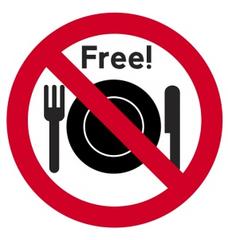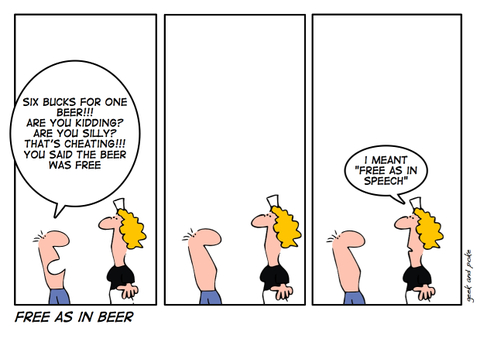What is Free?
The word free can be interpreted in several ways. One distinction can be made between the concepts of gratis and libre. The sense of free as gratis relates to cost; that cost could include monetary as in zero price, but it can also include other costs. Free as in libre relates the word free to the ideas of freedom and liberty; for example, not controlled by obligation, not enslaved, not subject to interference. The definitions used by the leading open/free movements include these ideas.
The Open Source Definition formulated by the Open Source Initiative (OSI) focuses on lack of restrictions, freedom of distribution, and freedom to alter. The Free Software Foundation's (FSF) definition frames free software as related to liberty rather than price. For both groups, free means freedom to copy, redistribute and change a program. One of the reasons given by the Open Source Initiative when they moved away from the FSF was problems with others' interpretation of the word free. The ambiguity of the word free complicates areas of the law especially ones that involve copyright. With the rise of Web 2.0, the word free has become even more ambiguous.
Free as in Speech
Richard Stallman, founder of the Free Software Movement, summarized his meaning of free in his slogan: "Think free as in free speech, not free beer."
"I believe that all generally useful information should be free. By 'free' I am not referring to price, but rather to the freedom to copy the information and to adapt it to one's own uses... When information is generally useful, redistributing it makes humanity wealthier no matter who is distributing and no matter who is receiving." Richard Stallman , Software Feedom Activist, 1990.
For the Free Software Movement, there is nothing free about proprietary software. For them proprietary software keeps "users divided and helps give developers power over the users," creating an unethical social system. (Stallman, What is Free Software, 2006) For this group, free is an ethical term related to our social system.
Free as a Marketing Tool
 The word free as used by marketers has a long and storied past. Most people have heard of winning a "Free Prize." But how often have people considered what that phrase means? Are there un-free prizes? Free from a marketer's perspective is a hook to attract a consumer. "25% More Free!" "Buy One, Get One Free!" "Free Download!" Free Shipping if you spend $39." "Free Sample." Most people would recognize that free in those terms is not often cost-free and can come with strings attached. With the rise of Web 2.0 on the internet, the word free has taken on more importance. The collaborative and social net of today allows marketers to attract users who will join and collaborate and in effect help build their companies.
The word free as used by marketers has a long and storied past. Most people have heard of winning a "Free Prize." But how often have people considered what that phrase means? Are there un-free prizes? Free from a marketer's perspective is a hook to attract a consumer. "25% More Free!" "Buy One, Get One Free!" "Free Download!" Free Shipping if you spend $39." "Free Sample." Most people would recognize that free in those terms is not often cost-free and can come with strings attached. With the rise of Web 2.0 on the internet, the word free has taken on more importance. The collaborative and social net of today allows marketers to attract users who will join and collaborate and in effect help build their companies.
Lawrence Lessig calls such companies Hybrids. Hybrids like Flickr allow users access to free images. Users can upload and share their images and build the company's database. The money source for a company like this is from advertising on the pages and the selling of premium accounts. Others have labeled companies who offer a free basic version to all and then offer premium accounts as "freemium." Chris Anderson, Wired editor, and author of Free: The Future of a Radical Price has written extensively on how internet companies have leveraged the power of "free."
"Free is both a familiar concept and a deeply mysterious one. It is as powerful as it is misunderstood. The Free that emerged over the past decade is different from the Free that came before..today's free is full of apparent contradictions: You can make money giving things away. There really is a free lunch and you get more than you pay for...Free is not new, but it is changing." (Anderson, Free, pg 4-5) Anderson's book is not about the free related to freedom, but rather the free related to cost. In the book Predictably Irrational, Dan Ariely looks at the reasons that the word "free" is so powerful to consumers, "Most transactions have an upside and a downside, but when something is FREE! we forget the downside. FREE! gives us such an emotional charge that we perceive what is being offered as immensely more valuable." Ariely concludes that the appeal of free is that there is no loss and thus no fear. (Anderson, p.64)
Dan Ariely on Free : The Cost of Zero-Predictably Irrational-Video
Different Versions of Free Economy
The first type of free economy is one where users freely share and collaborate. In this type of open economy, money is not involved. The Free Software Movement and the Free Culture Movement are proponents of economies where there is sharing of open resources. On the opposite side to an economy where the focus is not monetary is an economy that is exchange of some kind of goods/service for money. As mentioned above under Free as a Marketing tool, these economies may allow a certain amount of free to be given away, but the end goal is to make money.
Media Futurist Gerd Leonhard talks about different types of free and mainly refers to the cost. For him one type of free is defined by a condition where no one pays, another type called "Feels like Free" means that the payment is bundled or hidden. He sees low tiered users of so called freemium ( free at introductory level, pay for premium service) getting real value because a smaller group of others pay for the premium. His last version of free is where "3rd Party Pays." In this version the users pay no monetary cost because someone else wants access to their user data.(http://gerdleonhard.typepad.com/files/future-of-media-in-a-networked-world-gerd-leonhard-rome-public.pdf )
Chris Anderson Discusses History of Free
Upsides and Downsides of Free and Open
Free to many sounds like an awfully good idea, but others are not so sure "free" is a good thing. According to Nicholas Carr in The Amorality of Web 2.0, "The Internet is changing the economics of creative work - or to put it more broadly, economics of culture - and its doing it in a way that may well restrict rather than expand our choices. Wikipedia might be a pale shadow of Britannica, but because it's created by amateurs rather than professionals, its free. And free trumps quality every time."
Andrew Keen in Cult of the Amateur remarks on the loss of jobs and the cost to culture of free, "What you may not realize is that what is free is actually costing us a fortune...The new winners — Google, YouTube, MySpace, Craigslist, and the hundreds of start-ups hungry for a piece of the Web 2.0 pie — are unlikely to fill the shoes of the industries they are helping to undermine, in terms of products produced, jobs created, revenue generated or benefits conferred. By stealing away our eyeballs, the blogs and wikis are decimating the publishing, music and news-gathering industries that created the original content those Web sites ‘aggregate.’ Our culture is essentially cannibalizing its young, destroying the very sources of the content they crave.” (See more in our later pages Criticism of Open Culture and the Future of Free.)
Next up: Open Source and Free Software

